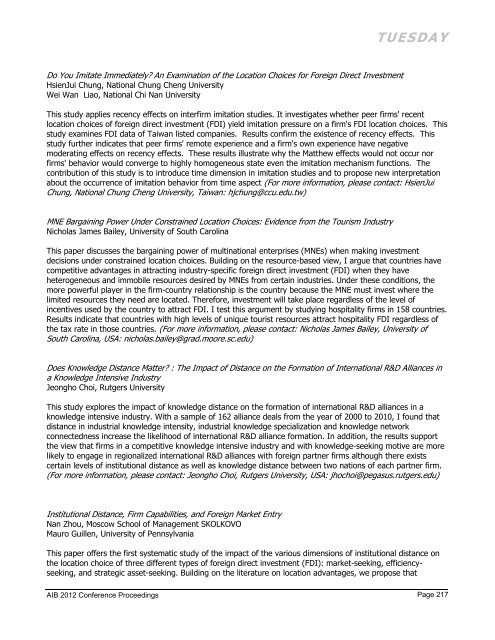AIB 2012 Conference Proceedings - Academy of International ...
AIB 2012 Conference Proceedings - Academy of International ...
AIB 2012 Conference Proceedings - Academy of International ...
Create successful ePaper yourself
Turn your PDF publications into a flip-book with our unique Google optimized e-Paper software.
TUESDAY<br />
Do You Imitate Immediately An Examination <strong>of</strong> the Location Choices for Foreign Direct Investment<br />
HsienJui Chung, National Chung Cheng University<br />
Wei Wan Liao, National Chi Nan University<br />
This study applies recency effects on interfirm imitation studies. It investigates whether peer firms' recent<br />
location choices <strong>of</strong> foreign direct investment (FDI) yield imitation pressure on a firm's FDI location choices. This<br />
study examines FDI data <strong>of</strong> Taiwan listed companies. Results confirm the existence <strong>of</strong> recency effects. This<br />
study further indicates that peer firms' remote experience and a firm's own experience have negative<br />
moderating effects on recency effects. These results illustrate why the Matthew effects would not occur nor<br />
firms' behavior would converge to highly homogeneous state even the imitation mechanism functions. The<br />
contribution <strong>of</strong> this study is to introduce time dimension in imitation studies and to propose new interpretation<br />
about the occurrence <strong>of</strong> imitation behavior from time aspect (For more information, please contact: HsienJui<br />
Chung, National Chung Cheng University, Taiwan: hjchung@ccu.edu.tw)<br />
MNE Bargaining Power Under Constrained Location Choices: Evidence from the Tourism Industry<br />
Nicholas James Bailey, University <strong>of</strong> South Carolina<br />
This paper discusses the bargaining power <strong>of</strong> multinational enterprises (MNEs) when making investment<br />
decisions under constrained location choices. Building on the resource-based view, I argue that countries have<br />
competitive advantages in attracting industry-specific foreign direct investment (FDI) when they have<br />
heterogeneous and immobile resources desired by MNEs from certain industries. Under these conditions, the<br />
more powerful player in the firm-country relationship is the country because the MNE must invest where the<br />
limited resources they need are located. Therefore, investment will take place regardless <strong>of</strong> the level <strong>of</strong><br />
incentives used by the country to attract FDI. I test this argument by studying hospitality firms in 158 countries.<br />
Results indicate that countries with high levels <strong>of</strong> unique tourist resources attract hospitality FDI regardless <strong>of</strong><br />
the tax rate in those countries. (For more information, please contact: Nicholas James Bailey, University <strong>of</strong><br />
South Carolina, USA: nicholas.bailey@grad.moore.sc.edu)<br />
Does Knowledge Distance Matter : The Impact <strong>of</strong> Distance on the Formation <strong>of</strong> <strong>International</strong> R&D Alliances in<br />
a Knowledge Intensive Industry<br />
Jeongho Choi, Rutgers University<br />
This study explores the impact <strong>of</strong> knowledge distance on the formation <strong>of</strong> international R&D alliances in a<br />
knowledge intensive industry. With a sample <strong>of</strong> 162 alliance deals from the year <strong>of</strong> 2000 to 2010, I found that<br />
distance in industrial knowledge intensity, industrial knowledge specialization and knowledge network<br />
connectedness increase the likelihood <strong>of</strong> international R&D alliance formation. In addition, the results support<br />
the view that firms in a competitive knowledge intensive industry and with knowledge-seeking motive are more<br />
likely to engage in regionalized international R&D alliances with foreign partner firms although there exists<br />
certain levels <strong>of</strong> institutional distance as well as knowledge distance between two nations <strong>of</strong> each partner firm.<br />
(For more information, please contact: Jeongho Choi, Rutgers University, USA: jhochoi@pegasus.rutgers.edu)<br />
Institutional Distance, Firm Capabilities, and Foreign Market Entry<br />
Nan Zhou, Moscow School <strong>of</strong> Management SKOLKOVO<br />
Mauro Guillen, University <strong>of</strong> Pennsylvania<br />
This paper <strong>of</strong>fers the first systematic study <strong>of</strong> the impact <strong>of</strong> the various dimensions <strong>of</strong> institutional distance on<br />
the location choice <strong>of</strong> three different types <strong>of</strong> foreign direct investment (FDI): market-seeking, efficiencyseeking,<br />
and strategic asset-seeking. Building on the literature on location advantages, we propose that<br />
<strong>AIB</strong> <strong>2012</strong> <strong>Conference</strong> <strong>Proceedings</strong><br />
Page 217

















